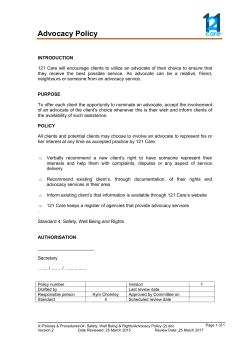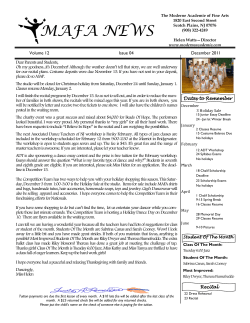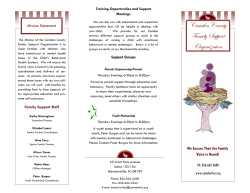
“Each time he dresses as his favorite superhero, talks about... become a fireman or tells me he loves me, I...
“Each time he dresses as his favorite superhero, talks about growing up to become a fireman or tells me he loves me, I am reminded why I fight.” The Traigle Family How to be an Advocate for Your Child Written by Rhiannon Traigle Photo by Karen Gros Photography 18 Winter 2009 What is an Advocate? J ust as fall began to arrive in October with relief from the hot Louisiana summer, my husband Ray and I sat on a bench at a local playground. We watched as our 10-year-old daughter Reagan and sevenyear-old son Riley laughed with delight and reveled in youth and freedom. As Reagan attempted to swing into the clouds, Riley yelled out to us, ‘watch me!’ He climbed the jungle gym, jumped across the rickety bridge, squealed as he slid down the slide and ran around to start the process again. For most parents on the playground, this was an ordinary afternoon. For us, extra-ordinary would be a better description. Like I often do now, I closed my eyes that day and tried to capture the moment like a photograph. I wanted to remember each second of it, every detail and the happiness it brought. I wanted, well want, to remember what it is like to see my son run, jump and climb before Duchenne Muscular Dystrophy robs him of these abilities and eventually his life. It seems like only yesterday Ray and I took our beautiful baby boy home from the hospital, elated to give Reagan a brother she would be able to love, play with and growup with. During the first five years and three months of Riley’s life, we were happy, and we were what I like to call, ‘in glorious ignorance.’ We dreamed, as most parents do, about what sports he would play, what college he would attend, when he would marry and how many children he might have. Little did I know that shortly after Riley’s fifth birthday, those dreams would be replaced with agony, grief and desperation to save my son’s life. Before the 2006 Christmas holiday, Riley’s pre-kindergarten teacher and a school physical therapist urged me to take him to the pediatrician. Riley had been unable to keep up with classmates on the playground and complained of being tired when walking across the schoolyard. We left the pediatrician’s office with a referral to a pediatric neurologist, but I still believed nothing was seriously wrong with my son. However, on January 24, 2007 Riley was diagnosed with Duchenne Muscular Dystrophy (DMD), a rare ge- If you look in a dictionary, you will get a definition similar to this, an advocate is any person who supports or defends another by speaking, arguing or pleading for their needs and rights. Prairieville resident Sandra Trammell’s seven-year-old daughter Mila was diagnosed with autism. Sandra is involved in various organizations such as Partners in Policymaking, LaTEACH, and she founded the Ascension Autism Support Group. She has devoted her time to advocating for her daughter. “I have reinvented myself,” Sandra said. “I take jobs where I can drop everything if the school calls.” Being an advocate for your child can take on many different forms. You may not be able to devote as much time to advocacy as other parents, but you can do something. It is up to you to decide how, when and where your efforts will be focused. Advocacy at its finest is doing the best for your child and yourself. netic disorder affecting primarily boys. Life as we knew it forever changed. My memories of receiving his diagnosis are blurred. Through tears, my husband and I stared in shock and disbelief at the perfect little boy in front of us. We were told between the ages of 8 and 12 he would be in a wheelchair, as a teenager his heart and lungs would begin to fail, and he would not live past his early 20's. Currently, there is no treatment and no cure. Since before Riley was born, I have spent my career helping others. I have fought for abused and neglected children, helped families of children with disabilities, counseled children with mental disabilities and helped hurricane survivors put their lives back together. I have been fighting for complete strangers. Now, I was fighting for my own son and had never felt so lost, hopeless and disconnected from the world. I didn’t even know where to begin. Within the first week of Riley’s diagnosis, I scoured the internet for information. I began reaching out to anyone who would listen. I posted ‘my story’ on every internet site that had anything to do with DMD. I immediately began calling local agencies and asking for help there, too. But everywhere I turned, I kept getting the same question, “What do you need?” My answer was always the same, “I don’t know; I just need help.” At this point, I only knew DMD was going to take my son, and I couldn’t stop it. During my desperate attempt to find help, either I got lucky or God put me in the right place at exactly the right time. One of my internet posts led me to two of the most wonderful influential women I have ever met—Pat Furlong and Lori Ware. These two women are both mothers who know the pain and heartache caused by DMD, and they both chose to fight back. Through them I learned there is hope for my son and all boys with DMD. I learned fighting for my son would be difficult, but I could give him a life better than I ever expected. They showed me how I could make a difference. I became an advocate. And by sharing the journey I and other parents have experienced, I hope your journey as your child’s advocate will be at least just a little easier. Parents are natural advocates You are the best advocate for your child because you know your child better than anyone else. Pat Furlong, Middletown, Ohio resident and founding president and CEO of Parent Project Muscular Dystrophy, lost two sons to DMD but continues to advocate for a cure. “Advocacy, by definition, means to influence outcomes,” Pat said. “Parents are ‘naturals’ in terms of advocacy. They want the best for their children and will do whatever is necessary. Parents do this from the moment Winter 2009 19 Rhiannon Traigle at the nation’s Capital in Washington D.C. in February 2009. Rhiannon was visiting for an Advocacy Conference organized by Parent Project Muscular Dystrophy. (Right) Riley and Dr. Brenda Wong. Dr. Wong is his neurologist at Cincinnati Children's Hospital Medical Center in Cincinnati Ohio. a child is conceived in simple and complex ways. Their advocacy agenda may be as simple as a change in diet or as complex as working on legislation to change federal or state policy. Parents who advocate for their [children] realize that a single voice is heard and that can make all the difference in the world. One young man with Duchenne said it best, ‘Mom, if you won’t fight for me, who will?’” Every parent should ask themselves, “If I don’t fight for my child, who will? Who would I expect to do a better job?” Create a support system Parents who advocate for their children realize that a single voice is heard and that can make all the difference in the world. 20 Winter 2009 As much as we would like to consider ourselves super moms and dads, the truth is we cannot do it all alone. Having a child with special needs brings about a unique set of challenges. It is OK to ask for help. It is also OK to take care of yourself and take a break. Find a support system of others to help you through your journey. This may be through a support group, clergy, school system, medical personnel, family, friends, spouse or other parents of children with special needs. When I need to cry or vent, I turn to my mother. When I need someone to help with medical appointments, my husband is there. When I need the latest information on clinical trials, I connect with other parents. Friends have organized fundraisers and events to support Riley and research to cure DMD. Take into account not everyone will be enthusiastic about your cause. Even family and friends may not understand your fight. Let people help where they are capable, and accept limitations of others who cannot help. Do not measure your success by the amount of tasks you accomplish, but by doing the best at what you can. Have a plan and get organized Whether you are advocating for medical treatments, financial assistance, education services or changes in law, in order to effectively advocate for your child’s needs, create a plan. 1. Ask yourself questions. What are my child’s current needs? What are my child’s short-term and long-term goals? What is it I am hoping to accomplish? 2. Write it down. Create a list of what you are striving to achieve for your child and a list of questions you need answered. 3. Get organized. File copies of all medical and school records and other important documents. Keep lists of contacts for service providers including specific names of people who assisted you, so you know who to contact in the future. 4. Be prepared. Bring documents that validate factual information with you to meetings. 5. Take notes. Keep written records of meetings and phone calls in case they need to be referenced in the future. 6. Be creative. Remember there is often more than one solution to a problem. If no one else has the solution you are looking for, suggest your own. Create awareness Public awareness creates a strong foundation for successful advocacy. At every opportunity, talk to people about your child and what you are advocating for. You are creating understanding and acceptance that facilitates change; and by promoting your cause, you are allowing others to share in the efforts that will afford better opportunities for your child and other children. Lori Ware, special education teacher in West Monroe, is the mother of seven-year-old Seph, who was diagnosed with DMD. “Advocating alone is putting the cart before the horse,” Lori said. “Without knowledge and awareness, effective advocacy cannot happen.” We help all kinds of kids learn every day, but we’ve always thought that special needs kids are just that - special. We can help them overcome their own unique set of challenges to achieve whatever goals they’ve set, and we do it in their home where they are most comfortable. Give us a call today and let’s start helping the special kids in your life, together. For many years, it seemed families of boys with DMD had to be resigned to the inevitable outcome. Through advocacy and awareness, science has progressed and possibilities for treatments and even a cure for boys with DMD are on the horizon. Maintain professionalism There may be many occasions you will become irate and frustrated in attempts to do what you believe is best for your child. This is a natural reaction and parents have every right to be upset with broken systems, unjust laws and roadblocks to getting help. Anger often fuels action, but positive outcomes are the result of positive attitudes. When trying to apply for services provided by the state, I was told Riley may not qualify because he did not yet ‘look or act disabled.’ Needless to say, I was furious. All I could think about was lashing out at the case manager. In this situation, and in every other exasperating situation since, I have learned pleading my case in a professional, Call Today! 225.328.2711 1.877.9TUTOR9 jboswell@tutordoctor.com www.tutordoctor.com Winter 2009 21 The doctors are experts in their field; but I’m the expert about my child. factual and composed manner yields better results. Despite my anger throughout my thorough discussion with the case manager, I kept my composure and Riley qualified. As for getting services for her son Davis, Lona said, “You catch more flies with honey. Find a way to get what you need by getting them into your corner.” Never Give Up Navigating the many various systems for children with special needs is difficult. Fighting for change is even harder. It is a fact you will be denied, rejected and ignored. Frustration, depression and hopelessness are words commonly understood by those of us in this struggle. But the truth is, services come and go, laws change, solutions are available and advancements are made. Baton Rouge resident Kodi Wilson’s threeyear-old son Braden has a rare mitochondrial disorder known as Leigh’s disease. Braden was not expected to live past two. Kodi’s battle for Braden’s needs has been difficult. But for moms like Kodi, it is her son’s diagnosis that drives her. “My strategy is about the kids that follow us,” Kodi said. “My approach on how to fix the problems is for other families as well.” I too am continuing to fight for not only my son, but for all children with special needs. My journey as an advocate is not any easier today than it was when I began two years ago; but today I don’t feel the level of agony, grief or desperation I felt then. Today, those feelings are being replaced with a sense of accomplishment and satisfaction. I will never stop being sad Riley has DMD, but each time he dresses as his favorite superhero, talks about growing up to become a fireman or tells me he loves me, I am reminded why I fight. Each time I meet a parent of a child with special needs, I am reminded I am not alone. Although our struggles may be different, our mission is the same. Advocating for our children individually may make a difference, but together we are unstoppable. 22 Winter 2009 Become an Expert Beginning your journey as your child’s advocate will not be easy. You may be expected to understand the special education system, disability laws, medical treatments and services provided by a number of agencies. Becoming an expert will not happen over night, so learn what is necessary first and take one step at a time. 1 Read scientific and medical journals with the latest information available. Search the internet, but be cautious the information is from a reliable source. 2 Contact agencies and service providers to learn what is offered. Most agencies have websites or pamphlets of information you can refer back to when needed. 3 Study state, federal and education laws affecting your child. Know your rights and responsibilities. 4 Attend conferences and seminars. Some may be hosted by professionals and others may be hosted by parents with a wealth of experience and information. Many of these events are created for medical personnel, researchers and social service workers, but are open to the general public. By attending conferences and seminars, you can meet others with common interests and speak face-to-face with experts. 5 Ask questions and seek answers. Don’t be afraid to call your doctor, school, special education director or a researcher across the globe. If those you contact are unable to answer the questions you have, continue searching for someone who can. 6 Make connections with other parents and adults with disabilities. They understand your journey and are often the most willing to help. Lona and Jared Collins became experts when their 20-month-old son Davis was born premature with a rare genetic disorder called DiGeorge Syndrome and with a heart defect called Truncus Arteriosus. For the first 15 months of Davis’ life, he lived in hospitals. He was flown back and forth from his hometown in Labadieville to Baton Rouge and Boston for multiple surgeries and for the fight for his life. The Collins made it there mission to become experts about their son’s medical condition. When asked about her experience Lona said, “It is 100 percent my job to know everything going on with Davis. The doctors are experts in their field; but I’m the expert about my child.” Because of Lona and Jared’s efforts, when the doctors were baffled, they worked together to find solutions. By making themselves experts on Davis’ medical conditions, the Collins made educated decisions about their son’s treatment.
© Copyright 2025





















